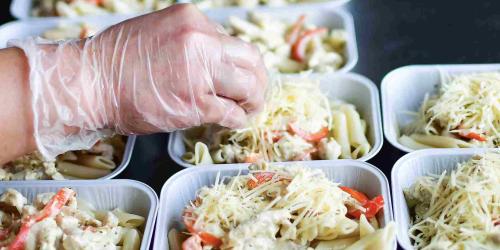Regular cleaning is essential to good hygiene, and that’s never been more important than right now – with many customers seeking assurance that you’re maintaining strict standards, and exercising vigilance to maintain safety.
Remember too that a case of food poisoning can lead to bad publicity, negative online comments and a drop in patronage – and that’s something no foodservice business can afford in the current climate. So make sure your staff are aware of the importance of all the points below:
-
Start with the basics by making sure everyone is in the habit of washing their hands regularly. This should be second nature given the focus of hand hygiene over the past 18 months, but you can’t assume – make sure staff are washing hands thoroughly especially before and after handling raw food.
-
Check for signs of pest infestation such as cockroaches and engage in pest control treatment as necessary. Protect food by storing it in sealed containers and keep windows, walls and doors secured and in good repair.
-
Keep chilled foods at the correct temperature – and make sure your fridges and freezers are in good working order and their thermostats are accurate. And don’t overstock them – because the ambient temperature will rise if there’s not enough room for air to circulate.
-
Food preparation surfaces not only need to be cleaned but sanitized – with suitable grade disinfectant. Wipe them down thoroughly and do the same to your cutting boards and grills.
-
Any food implements which come in contact with the floor must be thoroughly cleaned/disinfected before re-use. Cracked or chipped implements or chopping boards must be replaced, not re-used.
-
Minimise your cleaning workload by tidying up as you go. Clean up spills or messes as soon as practicable. Clean and wash surfaces after use.
-
Thoroughly clean your floors and ‘hidden’ surfaces such as shelves, alcoves, cupboards and garbage areas. Dirty floors are a safety risk as they can often get slippery.
-
Always keep your toilets clean as this not only presents a good impression, it reduces the risk of cross-contamination. Scrub toilet bowls and seats and the floor around the toilets, disinfect sink surfaces regularly along with taps and door handles, and ensure soap, towels and toilet roll dispensers are well stocked.
-
You should have a daily, weekly and monthly cleaning schedule for both back and front of house. The once per week clean should be more comprehensive and focus on areas which may get overlooked during the daily procedure, such as behind/under fridges and freezers, cupboards and shelves, garbage bin storage areas and difficult to access nooks and crannies.


